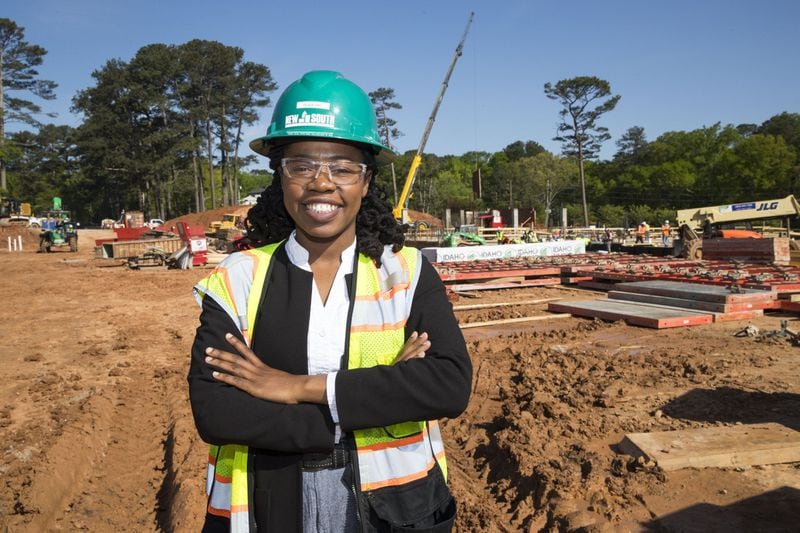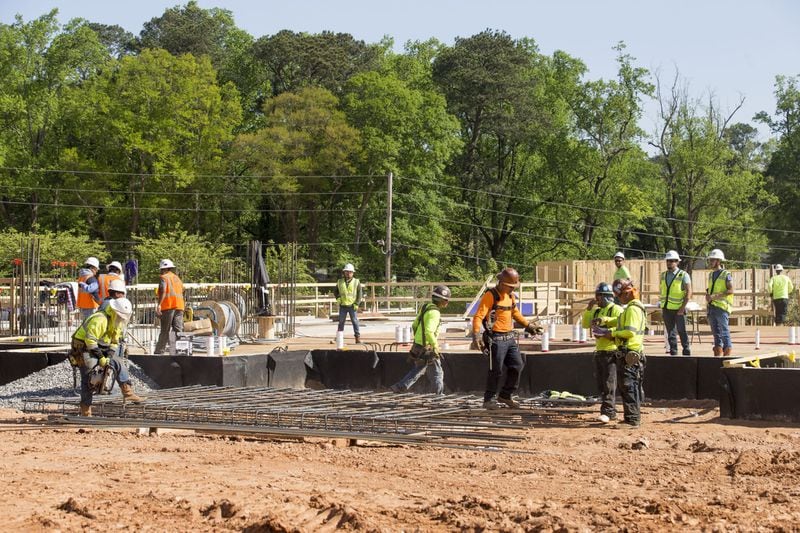The last five years have been great for the construction industry with spending at an all-time high of close to $1.3 trillion. The industry's growth places a high demand for a skilled workforce and further reveals a gap in the number of men and women working in construction.
According to the Bureau of Labor and Statistics, women represent only 9 percent of the total labor force in the construction industry, traditionally viewed as a male dominated field. Women working in the industry are concentrated mainly in the sales and office sector with fewer occupying the professional and management sector. Representation of women on the construction trades side is also low.
Economist Andrew Flowers with Indeed Hiring Lab, a team of economists who provide insights into the labor market said the difference in numbers could be a question of whether women are interested in the field, or whether companies create a culture of workplace balance that accommodates women.
Flowers says the demand for workers could be an opportunity for women to explore the thriving industry, because jobs posted are not being filled fast enough.
“More women would be potentially drawn into the construction industry because of how tight the labor market is,” said Flowers.
Flowers says overall construction industry job postings on his team's website are at the highest point in six years.
Better Pay, shorter line
The gender gap for women in the construction field is mirrored by the enrollment rates of female versus male students in technical colleges within the state. Data from the Technical College System of Georgia shows that last year, only 836 of the 10,730 students enrolled in construction related courses were female.
The biggest problem, according to Professor Khalid Siddiqi, chair of the Construction Management department at Kennesaw State University’s college of Architecture and Construction Management, is the lack of exposure of the program at the high school level.
“I feel really challenged that I cannot get the message to the schools where these students are coming from,” Siddiqi said.
The number is even worse for women because of age-old roles assigned to women.
Last Fall, only 11.6 percent of 388 students enrolled at KSU to pursue a degree in Construction management were female. Siddiqi however says the school has in the last five years increased the number of women in the program by 1,000 and hopes to see the numbers rising.
With the growing demand for skilled labor, Siddiqi sees a big opportunity for female students in the estimation and scheduling professions and the quick absorption of graduating students into the work force.
“None of our students have to look for a job…they get into full time employment because they already have the skill sets needed to hit the ground running,”says Siddiqi of the ready market for well trained industry workers.
The construction jobs prospects in Atlanta and the state in general are reflective of the booming construction industry nationwide.
According to the Bureau of Labor and Statistics, the city of Sandy Springs ranked 9th nationwide last year among metropolitan areas employing the highest number of construction managers in the nation, with 4,690 jobs created at an average hourly wage of $56.43.
The state ranked fourth nationwide among highest paying jobs for construction managers with the yearly wage at $113,930. The average hourly wage for a construction workers as of last month was $29.43, according to the Bureau of Labor and Statistics.
That, according to Siddiqi is indicative of growing prospects for those interested in the construction management field.
“I see a very strong possibility that females are going to be joining the construction industry because of not only lucrative pay but the realization that the jobs they prefer can make a difference in the city’s skylines,” said Siddiqi on the favorable job prospects.
Even in the wake of public outcry over gender pay discrepancies , jobs in the construction field have the narrowest wage gap with women earning 95.7% of what men get, according to the U.S. Department of Labor . This is much higher than the median gap of 20%.
Corporate efforts in closing the gap
Some construction companies and developers are involving themselves with ongoing efforts to bring gender parity in the industry through strategic policies.
Kevin Kuntz, President of the Southeast division of McCarthy Building Company Inc., which employs close to 2,000 people said his company is committed to diversifying its workforce to give equal opportunities to all employees to rise through the ranks based on performance regardless of their gender.
“When you bring in people of diverse backgrounds, they bring in diverse perspectives and with diverse perspectives comes very creative ideas and solutions” which Kuntz says result in better services.
According to company data, female employees accounted for 31.5 percent of the new hires the company took in last year, with most of the jobs in project engineering.
Women account for 24% of the total workforce for the company.
As data points to continued growth, industry insiders hope that the face of the typical construction worker also gets to evolve to allow women a chance to tap into the growth, as well as, the lucrative salaries that accompany the profession.
Daphne Bryson Jackson, the co-founder of the Women in Construction, Engineering and Related Services (WICERS) says having more younger women introduced to STEM-related courses will help boost the number of women in the field.
“This kind of generation has women who are bold. They come in and go full throttle,” adds Jackson.
Olivia Fru, project manager for a $90 million active adult community being built in Atlanta was not greeted by a growing economy or thriving construction industry when she graduated in 2007 from Southern Polytechnic State University. At the time, there were no jobs, and getting her foot into the door as a project engineer was “very difficult”.
But she hit the ground running when she landed her first job, despite reservations about her capabilities by one company president. She credits her start in the field to a vote of confidence on her behalf by a company VP who gave her a chance to prove her worth. Ten years later and close to 20 projects down, Olivia who is now managing a multi-million-dollar project where she oversees over 70 sub-contractors, the project schedule and finances says it has taken wits, hard work and ignoring some stereotypes to find her footing in the industry.
“Over the years I have let my abilities speak for me,” she says adding that she ensures that those working around her judge her by her abilities rather than the fact that she is a woman.
She is aware of the gap between men and women in the field and hopes for parity in numbers.
“Even with undergrad, it was maybe 5 women in the program,” she said adding that she has grown accustomed to working in a field where women are minorities.
At 31, Fru does not fit the profile of your typical project manager with a general contracting company.
“You don’t see people my age doing this. Companies are really looking to hire,” she said of current job market.
Her sights are set growing her career to become the vice president of a construction company some time in the near future. She sees no roadblock to her goals and hopes to see more women join the lucrative career.
“If more people get used to seeing people in these roles and even higher, then it becomes normal…” Fru said.
2.5 million construction jobs were lost between 2007 and 2010 due to the economic collapse, resulting to more than 300,000 women leaving the industry then.
Only 9% of construction workers in the nation are women, which is a substantially lower number compared to other industries — Bureau of Labor and Statistics
In 2017, women made up 6.7 percent of managers in the construction industry — Bureau of Labor and Statistics
The imbalance in women representation in the construction industry was mirrored by low enrollment rates among female students in technical colleges across the state in 2017-Technical College System of Georgia data
Despite low representation in the construction industry, the wage difference between men and women is lowest as women earn 95.7% of what men get — Bureau of Labor and Statistics
According to the Bureau of Labor and Statistics, Georgia ranks fourth nationwide for top pay for construction managers, with the hourly mean wage at $54.78 which translates to a yearly wage of $113,930.
Sandy Springs ranks 9th nationwide among metropolitan areas employing the highest number of construction managers in the nation. The city accounted for 4,690 jobs with an average hourly wage of $56.43.







